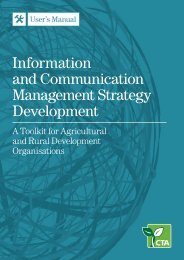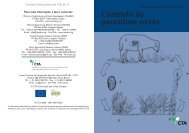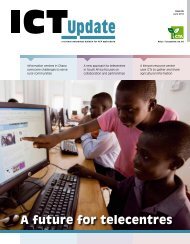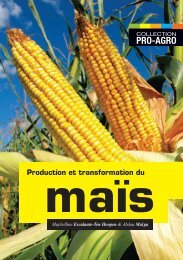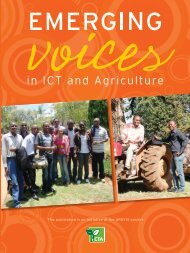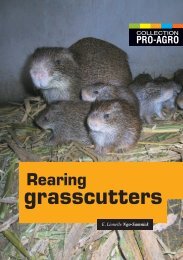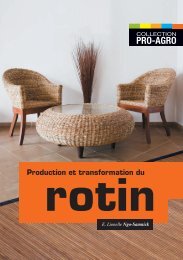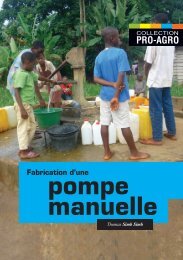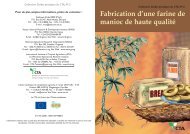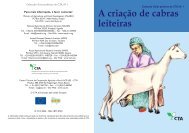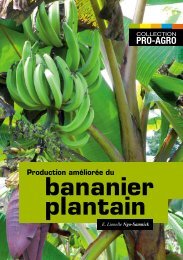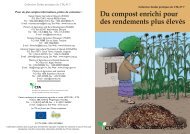Policy framework for Pastoralism in Africa
Policy framework for Pastoralism in Africa
Policy framework for Pastoralism in Africa
- No tags were found...
Create successful ePaper yourself
Turn your PDF publications into a flip-book with our unique Google optimized e-Paper software.
options. In general, much previous policy analysis has tended to emphasize access to high-valueexports market to Europe. There<strong>for</strong>e, while this strategy certa<strong>in</strong>ly does not discourage <strong>in</strong>vestments<strong>for</strong> the European markets, it also stresses the need <strong>for</strong> far more attention to markets with<strong>in</strong> <strong>Africa</strong>,and the need to support regional trade. The general trend of urbanization <strong>in</strong> <strong>Africa</strong> <strong>in</strong>dicates agrow<strong>in</strong>g domestic market <strong>for</strong> meat and milk which is an important opportunity <strong>for</strong> pastoral producers.There are also grow<strong>in</strong>g markets <strong>in</strong> the Middle East and Southeast Asia. A second strategyrelates to added value, and where economically viable, the need to reta<strong>in</strong> value locally throughmore process<strong>in</strong>g of livestock products.As with other areas of pastoral development, it is recognized that some countries and RECs arealready enhanc<strong>in</strong>g support to livestock market<strong>in</strong>g. For example, the creation of certification systemsto <strong>for</strong>malize <strong>Africa</strong>n regional and cross-border livestock trade is an important development, tailoredto regional contexts.In addition to the generic need <strong>for</strong> market analysis with stakeholders, are the follow<strong>in</strong>g specificstrategies:i. Develop livestock value cha<strong>in</strong>s, improve market access, reduce livestock trade barriers andnon-tariff barriers, enhanc<strong>in</strong>g market <strong>in</strong><strong>for</strong>mation systems and f<strong>in</strong>anc<strong>in</strong>g mechanisms;ii. Support the development of <strong>in</strong>frastructure and communications which enable livestock tradefrom pastoral areas, with emphasis on road networks and mobile phone networks;iii. Support economic analyses of the potential <strong>for</strong> free regional trade <strong>in</strong> livestock and livestockproducts and other commodities <strong>in</strong> pastoral areas to generate relevant benefits to participat<strong>in</strong>gcountries; this <strong>in</strong>cludes cost-benefit analyses of conventional ‘border control and taxation’approaches compared with <strong>for</strong>ex arrangements and commodity imports <strong>in</strong> free trade areas;iv. Develop comprehensive regional TAD control programmes based on contemporary epidemiological,economic and market analysis <strong>in</strong> cross-border pastoral ecosystems, with <strong>in</strong>volvementof all relevant stakeholders;v. Coord<strong>in</strong>ate and organize <strong>Africa</strong>n representation at the <strong>in</strong>ternational standard sett<strong>in</strong>g bodiesresponsible <strong>for</strong> trade standards on food safety and disease control.Strategy 2.5 F<strong>in</strong>ancial and <strong>in</strong>surance services tailored to pastoral areasIn common with many other services, conventional bank<strong>in</strong>g systems are not accessible to mostpastoralists. Formal loan arrangements are also based on collateral, def<strong>in</strong>ed <strong>in</strong> part as <strong>in</strong>surableassets. Although pastoralists can possess substantial f<strong>in</strong>ancial capital <strong>in</strong> the <strong>for</strong>m of livestock,<strong>in</strong> general the bank<strong>in</strong>g systems <strong>in</strong> <strong>Africa</strong> do not classify livestock as <strong>in</strong>surable, and there<strong>for</strong>e,pastoralists are excluded from <strong>for</strong>mal credit systems.In some countries there are progressive, alternative credit systems developed by private or government-ownedbanks that are tailored to the pastoral context. These schemes warrant expansionacross pastoral areas, with relevant policy and regulatory support. Two important elements <strong>in</strong>cludelivestock <strong>in</strong>surance arrangements, thereby provid<strong>in</strong>g pastoralists with collateral aga<strong>in</strong>st which tosecure loans, and, mobile phone networks which enable low-cost f<strong>in</strong>ancial transactions to and fromremote areas. Livestock <strong>in</strong>surance also has important implications <strong>for</strong> risk-based drought management,particularly if pilot schemes currently underway <strong>in</strong> <strong>Africa</strong> prove to be operationally andeconomically feasible.40 <strong>Policy</strong> <strong>framework</strong> <strong>for</strong> <strong>Pastoralism</strong> <strong>in</strong> <strong>Africa</strong>




